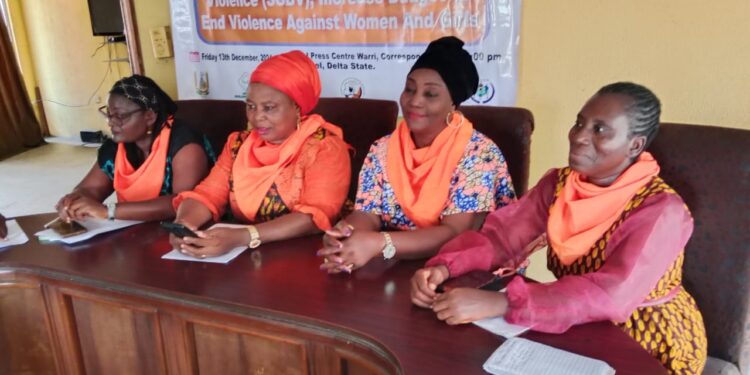The Women Advocates Research and Documentation Centre (WARDC) has called on the Delta State Government to adopt a gender-responsive budgeting framework to effectively address gender-based violence in the state.
The Non-Governmental Organization (NGO) made this appeal in collaboration with the Development Initiative for Community Impact (DICI) and members of the Delta Working Group for the Implementation of Violence Against Persons Prohibition Laws.
Addressing journalists on Friday in Warri, Dr. Rachael Misan-Ruppee, the Executive Director of DICI, urged the Delta State House of Assembly to prioritize addressing gender-based violence in the 2025 budget.
According to her, gender-responsive budgeting ensures that financial, material, and technical resources are strategically allocated to address the specific needs of survivors of sexual and gender-based violence (SGBV).
Misan-Ruppee explained that the framework would integrate a gender perspective into planning, resource allocation, programme implementation, and impact assessment.
She stated, “The essence is to ensure that limited resources are effectively utilised to achieve maximum results.
“We appeal to the Delta State House of Assembly to champion this cause by increasing budget allocations for SGBV prevention, response, and intervention in the state’s annual budget.
“The fight against SGBV is a fight for human rights, dignity, and justice. We must rise to these challenges by committing the necessary resources to build a society free of violence. Collaboration across sectors is key to ending violence against women and children.”
Misan-Ruppee, flanked by other leaders of gender-focused NGOs in the state, highlighted that violence against women and girls has far-reaching economic implications globally.
She noted that the passage of the Violence Against Persons (Prohibition) Act 2015 was a significant milestone in providing a legal framework to address violence against vulnerable groups in society.
She added that the Delta Violence Against Persons (Prohibition) Law 2020 marked a critical step towards localised solutions.
“However, the impact of these laws has been limited due to poor implementation mechanisms, lack of coordination, insufficient enforcement capacity, and inadequate funding,” she said.
Misan-Ruppee also emphasised that SGBV is a global pandemic affecting one in every three women in their lifetime.
She cited that in Nigeria, 7,349 cases of SGBV were reported, including incidents of sexual and physical violence, between January 2020 and July 2022, with Delta State recording 800 cases within the same period.
Among the participants at the event were Mrs Ayo Okotie, Executive Director of NEFEROK Development Initiative; Mrs Otorme Jarikre, Executive Director of the Victoria Jarikre Foundation; and Mrs Ezon-Ebi Odumosu, a member of NAWOJ, Delta chapter.



